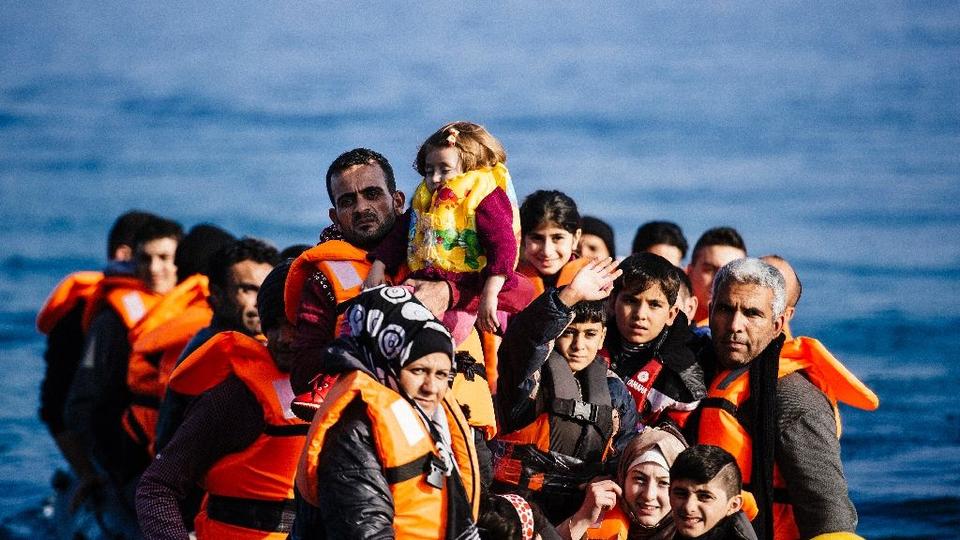Ahead of the continuation of the misdemeanour trial of Seán Binder and Sarah Mardini and 22 others, that is set to start today, the ICJ calls on the Greek authorities to support rather than criminally prosecute people who provide humanitarian assistance to migrants and refugees. The humanitarian volunteers should be acquitted.
“The use of the criminal law to punish persons courageously performing life-saving humanitarian assistance for people on the move is deplorable,” said Karolína Babická, legal adviser at the International Commission of Jurists. “There are concerns that major procedural flaws in the proceedings stand to undermine the defendants’ rights to a fair trial.“
Seán Binder, a volunteer working on search and rescue missions for the humanitarian NGO Emergency Response Centre International (ERCI), was arrested in Lesvos on 21 August 2018. Sarah Mardini, a student who took leave from her studies for a semester to travel to Lesbos to volunteer with the search-and-rescue group, was arrested on the same day. Both volunteers were detained in pre-charge detention for 106 days. The misdemeanour charges against Mardini and Binder as well as other defendants linked to ERCI, include espionage and forgery. ERCI is a registered nongovernmental search-and-rescue organization that regularly cooperated with Greek authorities on missions in Greek waters and on Lesbos from 2016 to 2018. The two volunteers, if convicted, face up to eight years of imprisonment.
According to Human Rights Watch, the charges are based on a police report that contains factual errors, including claims that some of the accused participated in rescue missions on multiple dates when they were not in Greece. The espionage charge is based on efforts of the defendants to identify migrant boats in distress, including by monitoring Greek Coast Guard and Frontex radio channels and vessels. However, as the police report acknowledged, anyone with VHF radio can access the unencrypted radio channels. The indictments sent to the accused list a variety of charges against various individuals but refer to them with the numbers 1 to 24, with no explanation of whom each number represents, leaving the defendants to guess which charges they are facing. The indictments are missing pages and were not translated for defendants who do not know Greek into a language they understand. Lawyers familiar with the case have said that some of the defendants never received an indictment or summons. Mardini, who lives in Germany, was previously barred from entering Greece to be present at her own trial.
Search-and-rescue efforts, in which Binder and Mardini were involved, are protected under international human rights law and Greek law. Equally, the right to be present at one’s own trial, defendants’ rights to be promptly informed of criminal charges in a language they understand, and the rights to prepare a defense are core fair trial principles, enshrined in international, EU and Greek law.
“Here, the severity of the threatened sanctions and administrative measures, is clearly capable of having a significant chilling effect on the civil society organisations committed to search and rescue activities,“ said Karolína Babická. “Not only are there violations of the human rights of the volunteers prosecuted, but such prosecutions, by discouraging humanitarian assistance, may contribute to more deaths at sea and to violations of State obligations under the international law of the sea and of the principle of non-refoulement,“ she added.
Greece over the years fails to address serious allegations of pushbacks and violence against people at its borders, which has been also confirmed recently by the European Court of Human Rights.
The Commissioner for Human Rights of the Council of Europe previously highlighted that a “worrying trend of criminalising those who save lives at sea is being perpetuated” in a 2021 Follow-Up Report, following her 2019 study on the use of criminal law to restrict the work of NGOs supporting refugees and other migrants.
In its Rule of Law report published in July, the European Commission noted the narrowing space for groups working with migrants and asylum seekers in Greece. A European Parliament report identified the current case as “the largest case of criminalization of solidarity in Europe.”
Background information
Twenty-four defendants face trial in Mytilene, on the island of Lesbos, on misdemeanour charges related to Emergency Response Center International (ERCI). The only trial hearing so far, in November 2021, was adjourned because the prosecution had filed the case before the wrong court, which held that it was not competent to try the case. The case was referred to the Appeals Court of the Northern Aegean, also on Lesbos.
There is also an on-going felony investigation, in which defendants have not yet been charged. Further charges include formation and membership of a criminal organisation, facilitation of illegal entry, infringement of state secrets, possession of a radio without a licence, and money laundering. If convicted, the defendants could face up to 25 years in prison. The trial has been repeatedly delayed.
For more details on Criminalization of humanitarian assistance, see ICJ’s briefing paper here: https://www.icj.org/eu-icj-briefing-calls-for-an-end-to-criminalization-of-humanitarian-assistance-to-migrants/
For more information, see the statement by HRW on 22 Dec 2022: https://www.hrw.org/news/2022/12/22/greece-migrant-rescue-trial-begin and by Amnesty International on 5 Jan 2023: https://www.amnesty.org/en/latest/news/2023/01/greece-farcical-trial-of-rescue-volunteers-begins-next-week/





